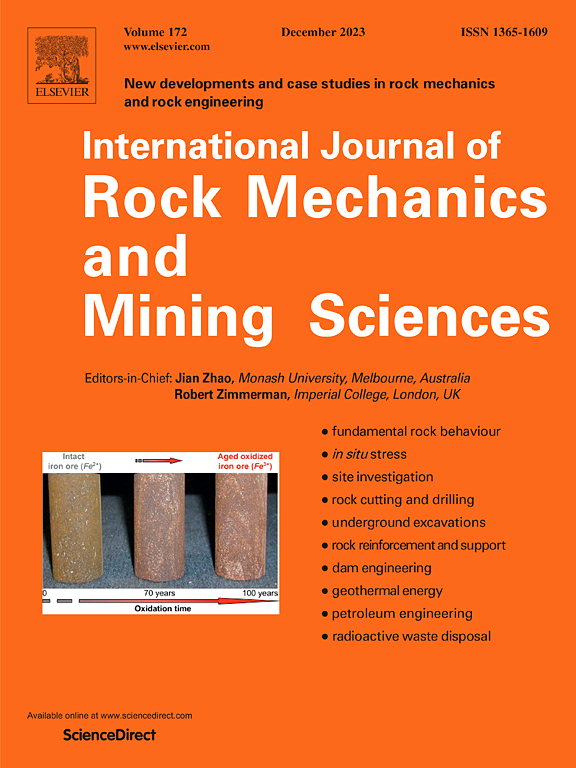岩盐流体渗流的水文-机械-化学全耦合连续模型
IF 7
1区 工程技术
Q1 ENGINEERING, GEOLOGICAL
International Journal of Rock Mechanics and Mining Sciences
Pub Date : 2025-02-01
DOI:10.1016/j.ijrmms.2024.105985
引用次数: 0
摘要
在穹状和层状岩盐地热储层中,原位岩盐地层的地球化学溶蚀作用会改变流体的输运性质,从而影响流体的流动。水力-机械-化学(HMC)耦合模型是评价岩盐地热系统中流体运移和评估其经济潜力的有效工具。现有的基于连续体的岩盐流体运移数值模拟以岩盐晶界多面体取向为潜在流体路径,采用依赖于变形的渗透率模型来描述压力驱动的岩盐流体流动。然而,这种数值方法完全是hm耦合的,忽略了岩盐溶解/沉淀对渗透率模型的影响。本研究通过采用反向矿物生长方法,扩展了依赖变形的渗透率模型,以解释岩盐溶解。利用这种扩展的(hmc -耦合)模型,我们捕捉到了地球化学反应与岩盐层在压力驱动流体渗流过程中的响应的相关性。由此得出的模拟结果预测流体压力低于hm耦合情景,突出了岩盐溶解对流体流过岩盐的影响。本文章由计算机程序翻译,如有差异,请以英文原文为准。
Fully coupled hydro-mechanical–chemical continuum modeling of fluid percolation through rock salt
In domal and bedded rock salt geothermal reservoirs, geochemical dissolution of the in-situ rock salt formation can alter fluid transport properties, thus impacting fluid flow. Coupled Hydro-mechanical–chemical (HMC) modeling is a useful tool to evaluate fluid transport through rock salt geothermal systems and to assess their economic potential. Existing continuum-based numerical simulation of fluid transport through rock salt relies on the polyhedral orientation of rock salt crystal boundaries as potential fluid pathways, employing a deformation-dependent permeability model to depict pressure-driven fluid flow through rock salt. However, this numerical approach is exclusively HM-coupled and overlooks the influence of halite dissolution/precipitation on the permeability model. This study extends the deformation-dependent permeability model to account for halite dissolution by adopting a reverse mineral growth approach. Using this extended (HMC-coupled) model, we capture the relevance of geochemical reactions on the response of rock salt formations undergoing pressure-driven fluid percolation. The resulting simulations predict a lower fluid pressure than the HM-coupled scenario, highlighting the impact of halite dissolution on fluid flow through rock salt.
求助全文
通过发布文献求助,成功后即可免费获取论文全文。
去求助
来源期刊
CiteScore
14.00
自引率
5.60%
发文量
196
审稿时长
18 weeks
期刊介绍:
The International Journal of Rock Mechanics and Mining Sciences focuses on original research, new developments, site measurements, and case studies within the fields of rock mechanics and rock engineering. Serving as an international platform, it showcases high-quality papers addressing rock mechanics and the application of its principles and techniques in mining and civil engineering projects situated on or within rock masses. These projects encompass a wide range, including slopes, open-pit mines, quarries, shafts, tunnels, caverns, underground mines, metro systems, dams, hydro-electric stations, geothermal energy, petroleum engineering, and radioactive waste disposal. The journal welcomes submissions on various topics, with particular interest in theoretical advancements, analytical and numerical methods, rock testing, site investigation, and case studies.

 求助内容:
求助内容: 应助结果提醒方式:
应助结果提醒方式:


